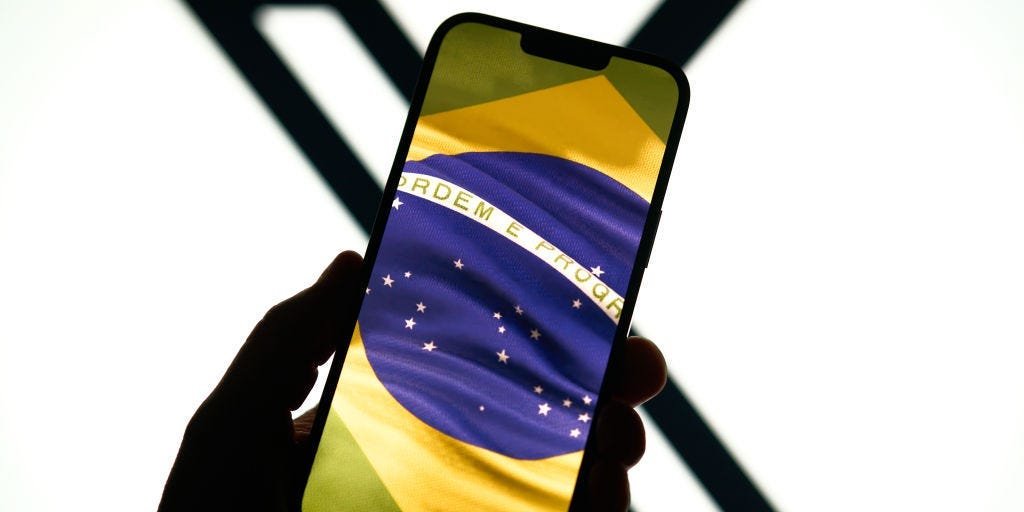A months-long battle between the Brazilian government and Elon Musk reached new heights this weekend when the country shut down access to the billionaire’s social-media platform, X.
But the conflict only grew more heated on Monday as Brazil’s telecom regulator set its own sights on another of Musk’s companies. Now, the Brazilian government is reportedly weighing slapping Musk’s Starlink with sanctions, according to Reuters.
It’s the latest escalation in the ongoing feud that caught global attention Saturday when Brazilian Supreme Court justice Alexandre de Moraes ordered access to X blocked nationwide, after the social-networking giant failed to comply with legal mandates about content moderation and to pay fines that currently exceed $3 million.
Over the weekend, Musk posted a volley of insults on X that sought to raise questions about de Moraes’ credibility and political motives, calling him “an evil dictator cosplaying as a judge.” In another post, Musk alleged without evidence that the justice had “engaged in serious, repeated & deliberate interference” in Brazil’s most recent presidential election, which saw far-right President Jair Bolsonaro defeated.
Starlink, a satellite internet system and subsidiary of Musk’s SpaceX, has become engulfed in the increasingly acrimonious clash in recent days. First, the Brazilian government froze several of Starlink’s bank accounts. Then, Starlink sent a note to Anatel, Brazil’s telecom regulator, indicating it would refuse to adhere to the court order to curtail access to X until its local accounts were unfrozen, Reuters reported Monday.
Now, Reuters reports that Anatel is contemplating levying sanctions against Starlink, which could include stripping the company of its license to operate in Brazil. Representatives for X and SpaceX did not immediately respond to requests for comment on Monday afternoon.
Musk escalates his attacks on Brazilian officials
De Moraes triggered the shut-down of access to X after the platform refused to appoint a legal representative to respond to government requests about removing content supporting Bolsonaro, who was barred last year from running for office again until 2030.
On Monday, a five-member panel consisting of fellow Brazilian Supreme Court justices upheld de Moraes’ decision to cut off access to the website, underscoring the judiciary’s support for the move even as Musk’s attacks mounted online.
Demand for VPNs in Brazil — one of X’s biggest markets — has surged since Saturday when X was blocked, despite threats from de Moraes to fine those using workarounds to circumvent the ruling some 50,000 reais ($8,900).
“Bravo Brazilians!” Musk wrote in a post on X in response to reports that people in the country were refusing to comply.
The X owner had other sharp words for the Brazilian government, including one post that suggested the company would seek to strip officials of some of their assets.
“Unless the Brazilian government returns the illegally seized property of X and SpaceX, we will seek reciprocal seizure of government assets too,” Musk wrote Monday, including a link to a CNN report about the US seizure of Venezuelan President Nicolás Maduro’s airplane.
“Hope Lula enjoys flying commercial,” Musk added, an apparent threat to Brazilian president Luiz Inácio Lula da Silva.
What the controversy could mean for Starlink
The government’s crackdown on Musk’s businesses could mark a significant blow for Starlink, which hhas tripled its operations in the country over the last two years, according to Brazilian outlet Folha de São Paulo.
The company, which launched in 2019, uses a constellation of satellites to provide internet access in some of the world’s most remote regions. In Brazil, it provides connectivity for more than a quarter million customers from the Amazon to Rio de Janeiro, according to its website. But Starlink has also drawn scrutiny for its role in international conflicts, including the war between Russia and Ukraine.
The standoff is the culmination of months of feuding between Musk and de Moraes, mainly over X’s refusal to remove far-right accounts and content that the Brazilian government deems extremist.
De Moraes has sought the removal of X accounts affiliated with groups he calls “digital militias,” which, he says, have spread disinformation to support Bolsonaro. The former president’s loyalists tried and failed to initiate a military coup following his 2022 election defeat, and stormed some government buildings in the capital.
But Musk has objected to removing the content, calling the orders censorship. He closed X’s Brazilian office in mid-August after de Moraes threatened to issue an arrest decree against Rachel Nova Conceicao, a legal representative for the company.
Read the full article here

















